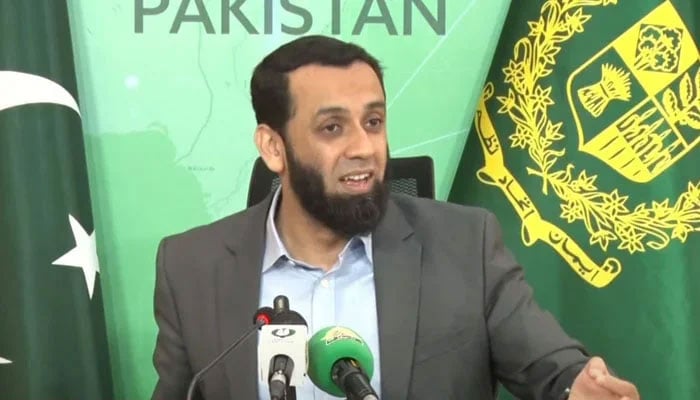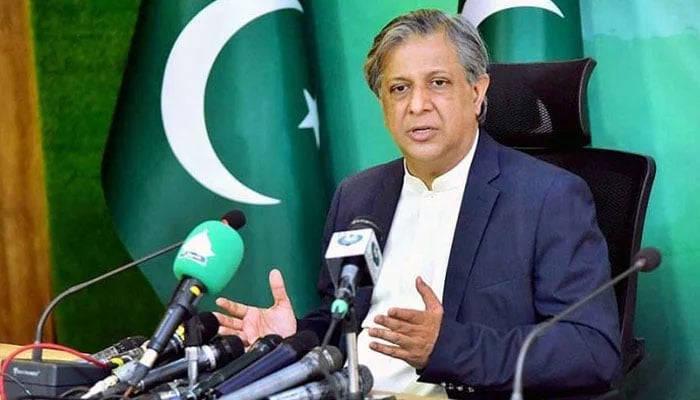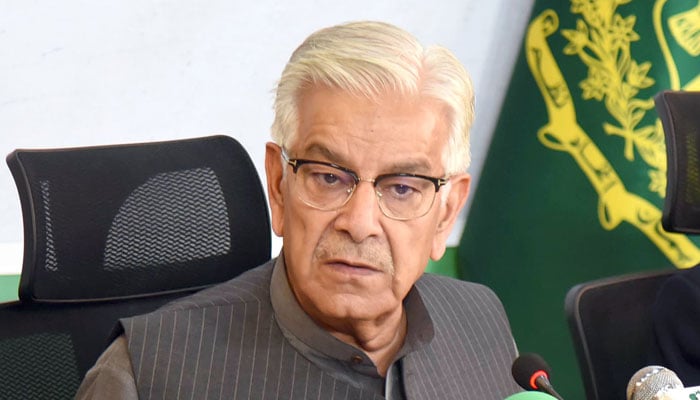Govt says fresh legislation not carried out for 'single person'
Tweaks were not introduced suddenly, as consultation was ongoing, says Information Minister Ata Tarar
ISLAMABAD: Federal Minister for Information Attaullah Tarar clarified that the fresh legislative reforms passed by the Senate and National Assembly on Tuesday were not carried out for a single person.
Tarar, on behalf of the government, defended the passage of six amendment bills in the parliament, including one extending the fixed tenure of services chiefs up to five years and the other increasing number of judges in the apex and high courts
The minister maintained that the legal tweaks were not suddenly introduced, revealing that consultation continued on the matter while Pakistan People's Party was also taken into confidence.
"The opposition was not ready to discuss the legislation," he said, speaking during Geo News programme 'Aaj Shahzeb Khanzada Kay Sath' on Tuesday.
Tarar's remarks came in the wake of the passage of the six bills approved by both the Senate and the National Assembly a day earlier, which turned into law after acting president Yusuf Raza Gilani signed them.
Gilani signed all six bills including the Supreme Court Number of Judges (Amendment) Bill, 2024, the Supreme Court Practice and Procedure (Amendment) Bill, 2024, and the Islamabad High Court (Amendment) bill, 2024.
"Extending the tenure to five years will not affect the institution's merit-based system," said Tarar, adding that the government also addressed the uncertainty regarding the appointment of the army chief.
Law Minister Azam Nazeer Tarar, on Tuesday, tabled the six bills which also inlcude the one seeking an increase to the number of judges in the Supreme Court up to 34 in a bid to clear the backlog of cases.
In addition to this, the minister presented a bill seeking to amend the SC (Practice and Procedure) Act 2023, aiming to include additions made in the 26th Constitutional Amendment, including the introduction of constitutional benches.
The bill sought to add Article 191A of the Constitution — the creation of constitutional benches — to the preamble.
Furthermore, the bill proposed another amendment to ensure that the act came into force at the same time as the 26th Constitutional Amendment Act, 2024.
Moreover, another bill — Islamabad High Court (Amendment) Bill, 2024 — seeking an increase in number of judges from nine to 12 in IHC was also passed.
Meanwhile, the bill to amend the Pakistan (Army/Air Force/Navy) Act Amendment, 2024, was presented in both houses by Defence Minister Khawaja Asif.
The parliament also adopted the Pakistan Air Force Act, 1953 and the Pakistan Navy Amendment Bill, 1961. It also proposed an amendment to Section 8C, which deals with the retirement age, which is 64 years, and service limits of service chiefs.
Commenting on the number of judges, Tarar maintained that having 34 judges is not necessary, the amendment mentions that the number could increase to that extent.
"The number of judges will be increased depending on the cases during summer and winter vacations," he said, adding that the demand of increase in the number came from the bar councils.
He added that the government's first attempt was to establish a constitutional court, but that was not done. "Legislation related to the judiciary was not done keeping any personality in front."
Demand for judicial reforms made by bar councils, says law minister
Meanwhile, speaking with journalists on Tuesday, the law minister also maintained that the number of SC judges was increased to 34 after much deliberation.
Whether the number of judges is 16, 20 or 28 judges, it is the Judicial Commission of Pakistan that will determine how many judges are required, said the minister.
"The Judicial Commission will decide how many judges it wants on the constitutional benches and on the registry benches," he said, adding that the major demand for this reform came from the Supreme Court Bar Association and the High Court Bar Association.
All four registries remain empty for years, he said, adding that one must think about those coming to Islamabad from Panjgur, Khuzdar, Dera Ghazi Khan or Upper Kohistan.
"After the 26th constitutional amendment, it was necessary for the most senior judges to be in the committee for the constitutional benches. The judges who will be transferred to the constitutional benches can also do other work along with their usual tasks," the law minister stated.
The chief justice, senior-most judges and senior-most judges in the constitutional benches will also be in the committee, he added. The minister also maintained that pending cases in IHC are increasing day by day.
Khawaja Asif says govt 'formalised' extension process
Meanwhile, commenting on the constitutional tweaks related to the extension in the tenure of the services chiefs, Khawaja Asif said that the process of extension has continued since the Ayub Khan regime and that the government has only formalised it.
In an exclusive conversation with Geo News, the defence minister said that the first-ever extension given by then-premier Feroze Khan to then-commander-in-chief General Ayub Khan in 1957.
"Ayub, Zia-ul-Haq and [Pervez] Musharraf gave themselves about 20 years of extension, while [Ashfaq Parvez] Kayani and [Qamar Javed] Bajwa received four years of extension from civilian governments," said Asif.
The minister maintained that the government has strengthened the institution instead of individuals by amending the extension law, adding that the tenure of other institutions is also five years and the purpose of the tweak is to create harmony.
"The extension of tenure will be applicable to all the three institutions — Army, Air Force and Navy. A specific individual or institution has not been favoured," said Asif.
Rulers in the past, he added, gave extension to army chief to prolong their time in power.
-
Security forces gun down 30 terrorists in multiple IBOs in KP: ISPR
-
MQM-P calls for new province in Sindh
-
US report validates Pakistan military edge over India: PM
-
Banned TTP poses serious threat to Pakistan security: UNSC panel
-
CM Afridi clarifies remarks on by-poll after ECP requests army deployment
-
Dubai sees 3.2m Pakistani passengers in 2025 as airport sets new milestone
-
Security forces kill 23 Indian proxy terrorists in KP's Kurram
-
Pakistan to construct island to boost oil exploration: report














